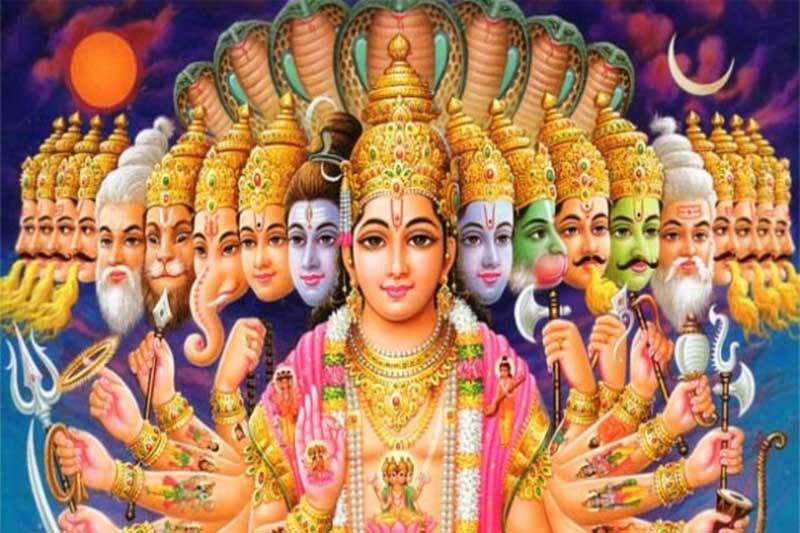What is Hinduism?
Hinduism is one of the world's oldest religions, with a rich history that spans thousands of years. It is often referred to as Sanatana Dharma, meaning "the eternal way" or "eternal truth." Hinduism is not just a religion but also a cultural and spiritual tradition that encompasses a diverse range of beliefs, practices, and philosophies.
Key Concepts of Hinduism:
Belief in One Supreme Reality (Brahman):
Hinduism teaches that there is one supreme, formless, eternal, and all-pervading reality called Brahman. Brahman is the source of all existence, and everything in the universe is an expression of this divine reality. Hindus may worship multiple deities, but they believe all deities are different aspects of the same ultimate reality.
Sacred Texts:
Hinduism has a vast collection of sacred scriptures that guide spiritual life and understanding. The most important texts include:
The Vedas: The oldest and most authoritative texts, consisting of hymns, rituals, and philosophical teachings.
The Upanishads: Philosophical writings that explore the nature of reality, the self, and Brahman.
The Bhagavad Gita: A dialogue between Lord Krishna and Prince Arjuna that covers key concepts like duty (dharma), devotion (bhakti), and the nature of the self (atman).
The Ramayana and Mahabharata: Epic stories that convey moral and ethical lessons, as well as the importance of dharma.
Karma and Reincarnation:
Hinduism teaches the law of karma, which states that every action has consequences, either in this life or future lives. Good actions lead to positive outcomes, while harmful actions bring suffering. Hindus also believe in reincarnation, the cycle of birth, death, and rebirth (samsara), where the soul (atman) is reborn in various forms based on one's karma.
Moksha (Liberation):
The ultimate goal of Hindu life is to attain moksha, or liberation from the cycle of reincarnation. Moksha is achieved by realizing the true nature of the self (atman) as one with Brahman. It represents freedom from worldly attachments, desires, and the limitations of the material world.
Dharma (Righteousness and Duty):
Dharma is a central concept in Hinduism, referring to living in accordance with moral and ethical principles. It encompasses duty, righteousness, and the path of right action. Dharma varies depending on one's age, caste, gender, and situation, but it always promotes harmony, order, and balance in society.
Deities in Hinduism:
Hinduism recognizes many gods and goddesses, each representing different aspects of the divine. Some of the most widely worshipped deities include:
Brahma: The creator of the universe.
Vishnu: The preserver, who incarnates in various forms (avatars) such as Rama and Krishna to restore cosmic order.
Shiva: The destroyer and transformer, who represents both the end and renewal of creation.
Lakshmi: The goddess of wealth, prosperity, and beauty.
Durga and Kali: Powerful goddesses who represent strength and protection.
Ganesha: The remover of obstacles, often worshipped at the beginning of important events.
Paths to Spiritual Growth:
Hinduism offers various paths to spiritual growth, depending on an individual's temperament and life circumstances. These include:
Bhakti Yoga (Path of Devotion): Worshiping and surrendering to a personal god through love and devotion.
Jnana Yoga (Path of Knowledge): Attaining spiritual wisdom and realizing the self's oneness with Brahman through study and meditation.
Karma Yoga (Path of Action): Performing selfless service and righteous action without attachment to the results.
Raja Yoga (Path of Meditation): Practicing meditation and controlling the mind and senses to experience inner peace and spiritual enlightenment.
Diversity of Beliefs and Practices:
Hinduism is not a single, unified religion but rather a collection of diverse traditions, rituals, and beliefs. It encompasses many different sects, philosophies, and practices, allowing for personal interpretations of faith. Some Hindus may focus on devotion to specific deities, while others may emphasize meditation, study, or selfless service.
Temples and Worship:
Temples (mandirs) are central to Hindu worship. Devotees visit temples to offer prayers, participate in rituals, and seek blessings from the deities. Worship can also take place at home, where many Hindus maintain personal shrines. Common forms of worship include chanting mantras, offering flowers and food, and performing aarti (a ritual of offering light to the deities).
Festivals and Celebrations:
Hinduism celebrates a rich variety of festivals, each with its own spiritual significance. Some of the most important Hindu festivals include:
Diwali: The festival of lights, celebrating the victory of light over darkness and good over evil.
Holi: The festival of colors, marking the arrival of spring and the triumph of good over evil.
Navratri: A nine-night festival honoring the goddess Durga and her different forms.
Maha Shivaratri: A night dedicated to the worship of Lord Shiva.
Krishna Janmashtami: Celebrating the birth of Lord Krishna.
Hinduism’s Universal Values:
Hinduism promotes a set of universal values that apply to all aspects of life, including:
Ahimsa (Non-violence): A commitment to non-harming and compassion toward all living beings.
Satya (Truthfulness): Upholding truth in thought, word, and action.
Respect for Nature: Reverence for all forms of life and a deep respect for the environment.
Tolerance and Acceptance: Hinduism embraces the belief that there are many paths to the divine, promoting religious tolerance and respect for diversity.
Hinduism’s Global Influence:
Hinduism has had a profound influence on cultures, societies, and spiritual traditions worldwide. Practices like yoga, meditation, and Ayurveda (traditional Indian medicine) have gained widespread popularity. Hindu philosophies of non-violence, compassion, and interconnectedness resonate with global movements for peace and environmental sustainability.
In conclusion, Hinduism is a deeply spiritual tradition that encourages individuals to seek truth, live in harmony with nature, and achieve spiritual liberation through devotion, knowledge, and righteous action. Its timeless teachings continue to inspire millions of people around the world.



